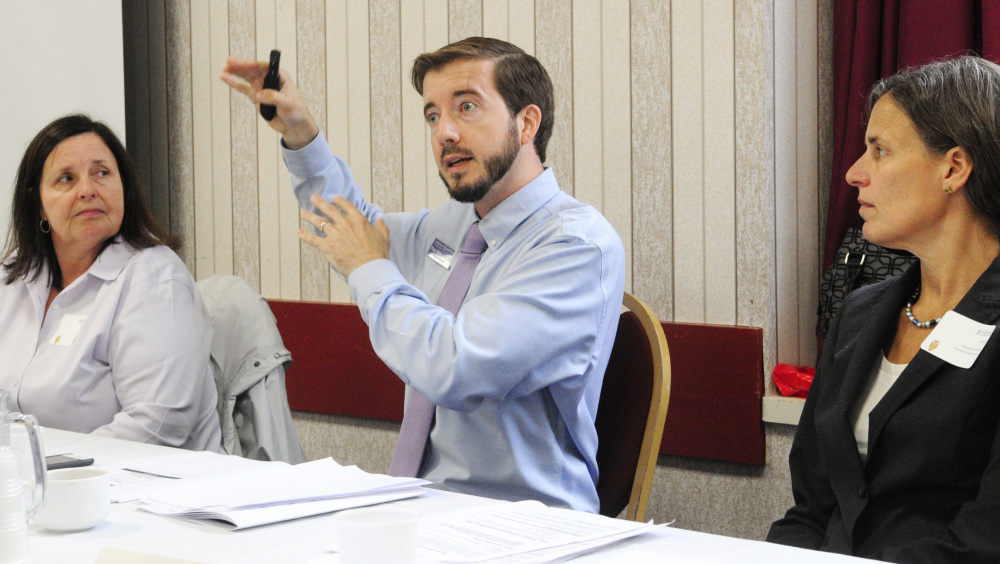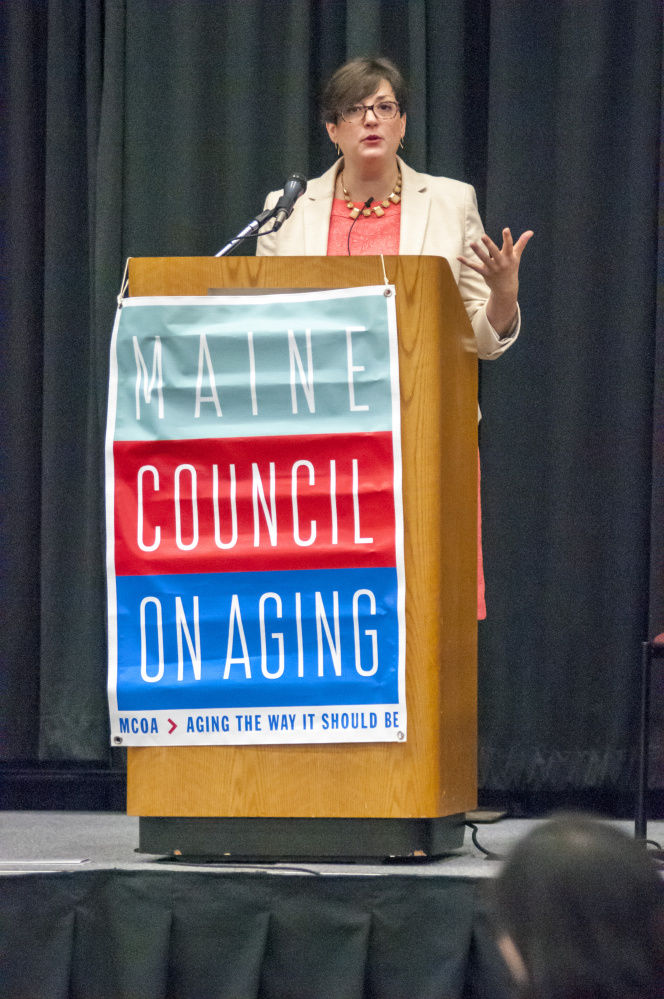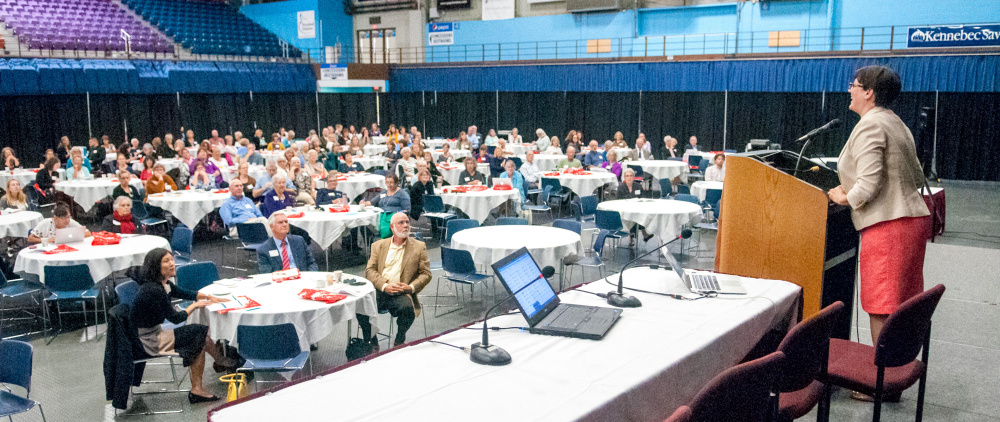AUGUSTA — Jacquie Guerin is well-acquainted with the challenges of aging.
She left a good-paying job in information technology to take care of her mother, who died at the end of 2014 after struggling with Alzheimer’s disease. When Guerin, who is 58 and now lives in Sanford, was trying to re-enter the workforce, she worried that her computer skills hadn’t kept up with the demands of the field, and that she would have trouble entering a new industry.
“I was scared to start over again,” she said Wednesday morning. “I was (in my 50s), and I was scared I wouldn’t get interviews because of my age.”
Guerin told her story as part of a panel discussion about the opportunities available to people who have been diagnosed with Alzheimer’s disease and dementia, as well as their caretakers, to continue working. The panel discussion was part of a daylong summit at the Augusta Civic Center hosted by the Maine Council on Aging.
The theme of the summit was “reframing aging,” and many of the workshops and presentations tried to focus on the ways that the state’s graying population is an asset, as opposed to a burden. Maine has one of the oldest populations in the country, with its median age of 44.6 topping the list of all states, according to a report this year by the U.S. Census Bureau.
The break-out sessions Wednesday focused on everything from starting businesses to learning to play musical instruments to helping the elderly stay in their homes.
Even though Alzheimer’s disease is often seen as a “gloom and doom” diagnosis, the panel discussion was partly meant to highlight how “folks (with dementia) live a good, long time and have the opportunity to keep contributing,” said Jess Maurer, an organizer of the summit.
Maurer is co-chairwoman of the Maine Council on Aging, an umbrella organization of groups that are focused on the elderly, and executive director of the Maine Association of Area Agencies on Aging.
Alzheimer’s is a progressive disease that affects about one in 10 people who are 65 and older, according to the Alzheimer’s Association. It can destroy memory and other important mental functions, and progress from mild confusion and forgetfulness to dramatic personality changes, according to the Mayo Clinic.
Dementia is a group of brain disorders that cause the loss of intellectual and social skills. Alzheimer’s disease can lead to dementia.
As Maine works to supports its elderly residents, “the next frontier” is extending those efforts to people with dementia, many of whom live alone and have minimal support, Maurer said.
In the panel discussion on how people with Alzheimer’s disease and dementia can remain in the workplace, Kristin Aiello, managing attorney of Disability Rights Maine, described some of the legal protections for workers when they have been diagnosed with Alzheimer’s, but stressed that every case is specific. She also highlighted protections available to caretakers, like Guerin.
Guerin described some of the struggles she experienced while looking after her mother, including paying for health insurance, burning through her savings and watching as her mother came to have difficulty with basic tasks.
But Guerin, tapping into the theme of the summit, also highlighted the advantages of her age when she was re-entering the job market after her mother’s death in 2014. After many unsuccessful job interviews, she said, she was eventually employed as a tax specialist at Baker Newman Noyes, a Portland accounting firm where she had previously interviewed for another position.
While re-entering the job market in her 50s was a challenge, Guerin now thinks her age was, in some ways, an advantage. She had patience and resiliency from taking care of her mother, and experience from her days working with computers.
“As scary as it was, because my concern was being older, from what I found in all my interviews, it wasn’t age (that was a problem),” Guerin said. “They said they prefer age, because it makes you dependable.”
The purpose of the summit Wednesday was to show how those sorts of traits – dependability, patience, resilience – are common in many people who have reached retirement age, said Maurer, one of the organizers of the summit.
In opening remarks, Maurer referred to the more than 80 Maine communities that have started efforts to aid citizens who want to age in their homes. She also referred to efforts by the state’s universities to integrate aging topics into their curricula and student life.
The keynote address was delivered by Julie Sweetland, a sociolinguist who works for the FrameWorks Institute, an organization in Washington, D.C., that helps nonprofit groups target their advocacy efforts. Working with groups focused on senior citizens, Sweetland’s organization has tried to portray aging not as a burden, but a process that builds momentum.
Sweetland advised any groups or people who are advocating for the elderly to think and communicate in similar terms. When researchers used the concept of momentum to describe aging, people who were listening were less likely to associate aging with the long-term costs of health care, and more likely to focus on the economic and social benefits that accompany growing older, Sweetland said.
In the afternoon, another keynote address was given by Pat Gallant-Charette, a 66-year-old who this year became the oldest woman to swim across several large bodies of water, including the English Channel.
Charles Eichacker can be contacted at 621-5642 or at:
ceichacker@centralmaine.com
Send questions/comments to the editors.






Success. Please wait for the page to reload. If the page does not reload within 5 seconds, please refresh the page.
Enter your email and password to access comments.
Hi, to comment on stories you must . This profile is in addition to your subscription and website login.
Already have a commenting profile? .
Invalid username/password.
Please check your email to confirm and complete your registration.
Only subscribers are eligible to post comments. Please subscribe or login first for digital access. Here’s why.
Use the form below to reset your password. When you've submitted your account email, we will send an email with a reset code.